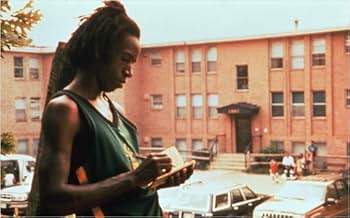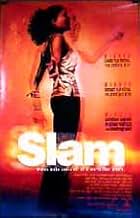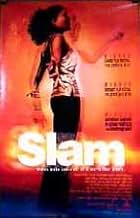Adicionar um enredo no seu idiomaGrand Jury Prize, 1998 Sundance Film Festival. A talented youth (Saul Williams) copes with urban crime and despair by competing in poetry slams. Sonja Sohn of "The Wire" costars.Grand Jury Prize, 1998 Sundance Film Festival. A talented youth (Saul Williams) copes with urban crime and despair by competing in poetry slams. Sonja Sohn of "The Wire" costars.Grand Jury Prize, 1998 Sundance Film Festival. A talented youth (Saul Williams) copes with urban crime and despair by competing in poetry slams. Sonja Sohn of "The Wire" costars.
- Direção
- Roteiristas
- Artistas
- Prêmios
- 4 vitórias e 4 indicações no total
- Public Defender
- (as Rhozier T. Brown)
Avaliações em destaque
To quickly generalize: if you appreciate Spike Lee's work, you'll probably like Slam. Although Spike might be a little upset that a white Jewish director brought this to film :-)
Basic story in two sentences Raymond Joshua (Saul Williams, also one of the film's co-writers) is set up to go to prison for pot, and while in prison he meets a few people that recognize his skills as a writer and poet.
When he gets out he wants to hold on to the freedom he knows he can attain, but he doesn't know how. With this conflict, Raymond is a character that is recognizable and identifiable with the audience. And with this, Williams creates a constantly believable performance even when his character may not sound entirely believable or realistic.
Although the performances are a plus for the film's success, such as Bonz Malone as Hopha, and Sonja Sohn as the writing teacher/poet Lauren, for me the style over-passed the substance. Though the poetry was inspired and the poets in the film who spoke them were very good, some of the story elements were not as effective as they could've been. For example, there's a blind-men analogy when Raymond gets out of jail and sees that his pot-dealer friend, who got shot, is now blind. Raymond is morally in the right in their final scene together, but it's a little too thick of a message for my taste when Raymond says, 'I once was blind too, now I can see.' Williams' poetry (which I assume he wrote himself) is interesting, although it's his delivery that catches my ear over the content. In a pivotal scene his poetry saves him from a beating in the prison yard, yet somehow it doesn't feel as real as some of the other scenes, like with him and Malone's character.
As I said, the style was what held the film, especially for such a low budget. I loved the use of the hand-held, shaky mis-en-scene, as though someone was allowed to peek into the atmosphere of DC. And from a psychological standpoint, Levin seems to extract what the essence is of Raymond and his neighborhood. Through his usage grainy color and then to a 8mm camcorder for flashbacks from Raymond, I felt the emotional impact that Levin was going for, the mix of disorientation and of being in a free-fallin' kind of society where you don't know what can happen next. I just wished that I saw more of that with the characters and the story. Cool ending though. B
When Ray participates in a drug deal gone bad and is arrested for possession of a controlled substance and suspicion of homicide, he starts to realize the odds of him fighting this and winning his freedom back is slim to none. While in jail he is defined as a typical African American drug dealer but he begins to fight back when he finds a way to resolve a fight between to gangs by blessing them with his free written poetic rap which talks about the forces that try define him. Ray fights back and attempts to change the way he lives his life by trying to end the revenge between the people that shot his friend in a drug deal gone bad. Not even the violence can define Ray as he uses his imagination to express all his feelings through poetry. He begins to go down the right path when he gets out of jail and does everything in his power to live above society's definition of him and try to better his surroundings. He does this when he stands up to his enemies and explains that revenge is pointless and they should just squash their beef.
Extra Credit One theme I saw replay itself in the movie is how the public views people like Ray and how these people fall right into societies trap because it's the only way they know. Nobody expects for these Washington D.C. punks to ever grow out of the ghetto and make something better of themselves. Ray really proves his society wrong when he shows everyone that he can be a good person and he expresses this through his poetry which opens up a whole new group of people who teach him the typical or expected way isn't always the way to go. Society views Ray and his community as "public enemies number one" because everyone assumes they will all just become drug dealers or killers and end up in jail. This is a horrible stereotype that is seen everywhere in the world and can define the people in the ghetto. It takes a strong man to live above this definition and try to make something better of himself.
My favorite part in this movie is when Ray attempts to stop or delay a fight about to break out in the jail yard. I loved this part because anyone can write a poem and make it rhyme, but it takes a strong motivated individual to use his poetry as a way to make people think about the decisions they make and ultimately put a stop to a deadly situation. I can relate to when Ray was meeting with his public defender and he was given the ultimatum of either going to trial and fear losing or pleading guilty for less time even if he was guilty. When I was in eighth grade I worked at a concession stand at a football field where I was accused of stealing money. I denied stealing the money and I was told either I admit to stealing the money and giving it back or they were going to call the cops. I told them to call the cops because I knew I was innocent. About a week later I got a call from the woman who runs the concession stand and she explained that another worker and her own son had admitted to stealing the money. I felt helpless when I was given an ultimatum because I realized that when people don't believe you, you could be paying the consequences for another person's wrong doing. I could tell that Ray felt helpless and trapped in between two negative outcomes. This film sends the viewers a message that if you don't try to better yourself from the people around you, then you will fall into societies definition of a typical ghetto troublemaker. I would recommend this film because it urges the importance of living above what's expected of you and I think a lot of young kids these days don't realize that.
It's not the best acted film in the world, like some reviewer said, but it might at the top level among the other best. The film is also very nicely shot. It doesn't actually feel like a documentary, but more like what it really is: Quite cheaply and simply (=that means freely) made self-expression. You can feel the joy of the making. I don't have to even mention that the soundtrack is great: One of the best. The world needs this kind of movies. (Or does it?...) At least somebody's world does. Somebody else's world might need movies that glorify violence. This is not that kind of movie. This is not 50 cent. This is not death. This is life.
Also, anyone who knows Washington, D.C. will recognize that this was a great use of D.C. as the setting for a movie. Usually D.C. is used as just a pretty backdrop, but in this movie you saw real sites like the Projects of Southeast and Capitol Hill's Eastern Market, and recognized that D.C. is a city of real people and not just a place aliens blow up.
Você sabia?
- CuriosidadesThis film was restored by the Academy Film Archive and the UCLA Film & Television Archive. Funding was provided by the Academy of Motion Picture Arts and Sciences, Sundance Institute, UCLA Film & Television Archive, and the restoration premiered in 2024 at the UCLA Festival of Preservation.
- Erros de gravaçãoWhen Ray is on his way to the poetry night, he gets on the metro at the Cleveland Park station, rides, and gets off at the metro at the same station: Cleveland Park.
- Citações
Ray Joshua: The wind is the moon's imagination wandering. It seeps through cracks, ripples the grass, explores the unknown. My love is my soul's imagination. How do I love you? Imagine.
Principais escolhas
- How long is Slam?Fornecido pela Alexa
Detalhes
Bilheteria
- Orçamento
- US$ 1.000.000 (estimativa)
- Faturamento bruto nos EUA e Canadá
- US$ 1.009.819
- Faturamento bruto mundial
- US$ 1.009.819
- Tempo de duração
- 1 h 40 min(100 min)
- Cor
- Mixagem de som
- Proporção
- 1.85 : 1




























